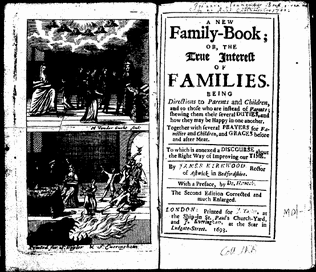 In seventeenth-century England, the role of servants was far more nuanced and flexible than readers today may realize. Certainly, there was a long-standing patriarchal expectation that the head of a family would maintain a godly and dutiful order over his household. In advice manuals, published letters and sermons, men were repeatedly admonished on how to treat the servants living in their homes. Men were expected to provide food, shelter, religious instruction, and a disciplined hand, much as they were expected to treat their own children and wives. They were not supposed to treat their servants as slaves; indeed, quite the opposite. However, we must always consider the tensions between prescription and practice. Just because the expectations were stated, most certainly does not mean that the expectations were met. For example, in Advice of a father, or, Counsel to a child (1664), men were admonished to:
For this reason, as the last injunction suggests, discretion was particularly important (perhaps because it was not always be realized). The Early English Books are full of tales of servants blackmailing their employers, because they had discovered something the master (or mistress!) would rather have kept hidden (e.g. adultery, gambling debts, infanticide etc). Thus, the same advice manual warns:
This last point suggests that even the lowest servant in his employ should be treated as all the other servants were treated.While the master was expected to rule with a firm hand, he was more like a benevolent monarch than a tyrant:
There's a pragmatic realization here that seems to transcend the ages. If you work someone without letting them "blow off steam," then you run the risk of having unmotivated, even hostile or violent, servants in your household. This holds with the reality of homicide trends in the 17th century: Far more servants killed their masters, than masters killed their servants! This injunction also fits in with the many accounts across the Early English books of servants getting some days off, attending the theatres and fairs, going to market, visiting family, even sharing in merriments with the family. While the author of this piece would mostly likely call for moderation, it's clear that masters did give their servants more freedoms than might be assumed. 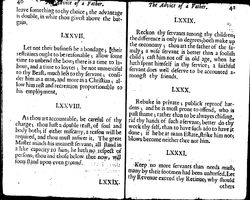 Anon. (1664). Advice of a father Anon. (1664). Advice of a father I want to point out one other piece of advice offered in this manual: "Reckon thy servants among thy children; the difference is only in degrees; both make up the economy; thou art the father of the family; a wife servant is better than a foolish child; cast him not off in an old age, when he has spent himself in thy service; a faithful servant does well deserve to be counted among thy friends." There was, without a doubt, a recognition that loyal servants could become more like members of the family over time. In this particular injunction, the master is told not to throw out his servants just because they have become old, but rather to take care of them. The best example I can think of, to help illustrate how a servant could become like a family member over time, is to draw on a 1960s reference: Would the Brady Bunch have thrown out Alice? In my recent novel, A Murder at Rosamund's Gate, I touch on a lot of these issues. I deliberately placed my protagonist Lucy Campion, in the household of a magistrate, at a time when Enlightened principles were starting to emerge in England. In my story, I deliberately juxtapose the reasoned household of the magistrate, with the less disciplined households that surrounded them. I wanted my magistrate then to be a more Enlightened thinker, more concerned with ideas, than the person who suggested those ideas to him. So he could have listened to and believed in the views of a servant with an intelligent lively mind. Perhaps I gave Lucy too many freedoms, perhaps I didn't. Ultimately, I do not think there is any blanket, all-encompassing way to look at the relationship between masters and servants in 17th century England. Arguably, these attitudes may have changed in the 18th and 19th century (although I doubt there was a monolithic understanding of this relationship even then), but the bottom line is this: The relationship between master and servant in the 17th century was far more nuanced and flexible than is often assumed. This is my story, and I'm sticking to it!
5 Comments
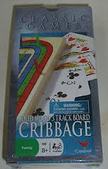 So my son recently received a cribbage game--a game I didn't know too much about but which looked fun enough. When we started to play, however, I happened to read this blurb on the packaging: "Cribbage is believed to have been invented during the 17th century by an English poet." What? Whoa! Cribbage is a 17th century game? Invented by a poet? What poet?! I had to look into this. So, of course, I typed in "History of Cribbage" into the almighty Google, and sure enough I found that "Cribbage was invented in the early 1600s by Sir John Suckling, an English courtier, poet, gamester and gambler." But since I tend not to believe what I read on the internet, I double-checked this information with the well-regarded Dictionary of National Biography. The DNB confirms the circumstantial evidence concerning the invention of the game, citing the biography of Suckling (1609-1641?), written by 17th century antiquarian John Aubrey (1626-1697) in his collection called Brief Lives. 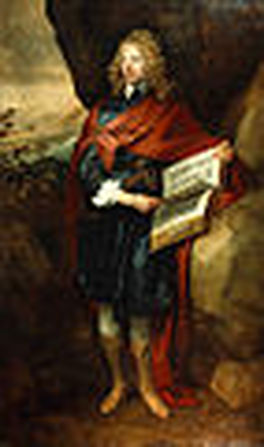 Sir John Suckling -Courtier & Cribbage Creator Aubrey portrays Suckling as quite a merrymaker, anecdotally recalling him as "the greatest gallant of his time" (287). Suckling was, too, alleged to be the "greatest gamester, both for bowling and for cards." He had such a reputation for gambling, it would seem, that "no shopkeeper would trust him for 6d, as today he might by winning, be worth 200 pounds, and the next day he might not be worth half so much" (287-291). Surprisingly, Suckling wasn't actually very good at cards...a bit of a problem for a compulsive gambler. To make up for this deficit, he would "by himself abed, and there studyed how the best way of managing the cards could be." Indeed, he figured out a variation of an existing game--Noddy--which he called "cribbage." Apparently others liked cribbage as well, and he came to make a lot of money off of his reinvention. As Aubrey tells us: "Sir John Suckling invented the game of Cribbidge. He sent his Cards to all Gameing places in the countrey, which were marked with private markes of his; he gott twenty thousand pounds by this way." However, Suckling had a weakness for "Ladies of Quality, all beauties and young." This weakness ended up costing him "many hundreds of pounds," apparently because he enjoyed lavishing them with "silk stockings, garters and gloves." (Brief Lives, 289).
Fun guy, to be sure! Suckling, however, was more than a courtier and a ladies' man. He found time to write--quite prodigiously--and demonstrated some fine insights into the larger political context of the day. All told, he wrote seventy-eight poems, four plays, a few political tracts, as well as at least fifty letters, which according to Aubrey, displayed great intelligence and a "sparkling wit." (287-291) It's actually interesting to consider Suckling's personality when you reflect on the game. After all, cribbage offers a funny balance of strategy and luck, as well as a carefree leapfrog quality. Suckling's dual love of gambling and carousing at play? Just a thought. Eventually, his bad luck at gambling and in love seem to have caught up with him. Sadly, at age 28, when faced with great financial losses, Suckling poisoned himself, "which killed him miserably with vomiting" (291). A sad end...but at least he gave us cribbage. We think. 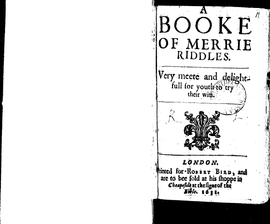 1631 STC /1476:06 Riddles, jests and other merriments always sold well in seventeenth-century England. Then, as now, people enjoyed a good laugh--being surrounded by plague, terrible sickness, fire, Puritans, etc may have had something to do with that! When I came across A Book of Merrie Riddles--claimed to be "very delightful for youth to try their wits"--I couldn't resist offering a few to YOU. Let's see what you make of these seventeenth-century jests. First, I'll give you few questions with solutions. Then, I'll give you a few without; see what you come up with. Question: I wound the heart and please the eye. Tell me what I am, by and by. Solution: Beauty. Question: When I did live, then was I dumb, and yield no harmony: But being dead, I do afford most pleasant melody. Solution: Any musical instrument made of wood. Easy, right? Of course there are a few a little more inscrutable today: Question: Who wears his end about his middle once in his time? (I would let you figure out this one, but it's pretty contextually situated.) Solution: A thief whose arms are tied with the halter, wherewith he shall be executed. Hmmm.... So here are a few more...what do you think are the solutions? Question 1: I do walk, yet I do not go. I do drink, yet no thirst lack; I do eat, yet do not feed; I do wake, yet no work make. What am I? And another: Question 2: I was not, I am not, I shall not be, yet I do walk as men do see. What am I? ********************************************************** Let me know: Are you as smart as a 17th century youth? I'll post the answers soon..... *********SPOILERS!!! Solutions ahead!!!***************
I figure that's sufficient space, if you're really concerned. Question 1: so, so, SO LAME. The solution is "Someone moving about in a dream." Question 2: so, so, so, SO, SO, SO LAME! (or fiendishly clever, you decide). The solution is "A person with the surname of 'Not'." As in Susie Not. NOT!!! 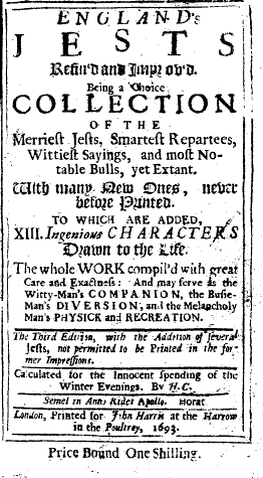 So if you're at that seventeenth-century dinner party that I mentioned in my last post, you'll want a few "merry jests, smart repartees, witty sayings, and a few notable bulls" to amuse and delight your friends (that is, if you want to transcend urine tricks and flatulence). (Not jokes though--apparently the word joque, from the Latin iocus "jest, sport, pastime'--had only just emerged in England in the 1660s, and was only just entering the seventeenth-century vernacular.) This particular jest-book, Humphrey Crouch's England's Jests Refin'd and Improved (1693), one of England's first such collections, offers equal opportunity digs at all manner of people: gentry, magistrates, royals, Quakers, Catholics, priests, Jews, foreigners, scholars, students, old people, young people, pregnant women, scolds, rakes, brothel-keepers, cuckolded husbands, criminals awaiting execution--you name it. Many jests were political or religious in nature but, as you might imagine, such humor doesn't always translate easily across three centuries (and English doesn't always translate to American. HA!) However, this one just amuses me. "A witty young fellow was try'd for his life, since his Majesties Restoration. And being caught, they told him he must be hang'd: But he pleaded in his own defence a long time; at last desir'd the Judge, That if he must be hang'd, he might be hanged after the new way that Oliver was, three or four years after he was dead." (The corpse of the Lord Protector Oliver Cromwell had been dug up and hanged posthumously two years after Charles II was restored to the English throne. Yup, as gross as it sounds.) And, I could skip the obligatory lawyer jest but I won't. "A certain person speaking unseemly words before a Gentlewoman, she ask'd him what profession he was of. Madam, says he, I am a civil lawyer. Alas, Sir, she replied, If Civil lawyers are such rude people, I wonder what other Lawyers are." Mwah ha ha! Civil lawyers. (Okay, fine. Maybe not that funny) Of course, I imagine bawdy humor will still translate best.... "Two friends meeting, one being overjoyed to see the other. Hark you Sir, said he, Between you and I, my wife's with child. Faith, cry'd the other, you're a liar, for I have not seen her this twelve months." (Awk-ward!) "A young woman, having married a great student, who was so intent on his studies, that she thought herself too little regarded by him, and one day when they were at Dinner with some Friends, she wished herself a book, that she may have more of her Husband's company. If it must be so, says her husband, I wish thou wert an Almanack, that I might change thee for a new one once a year." (Ouch!) 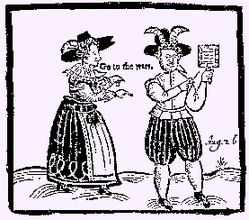 the witless cuckolded husband (with horns!) "One that had only been married but a week called her husband a 'cuckold,' which her mother hearing, reproved her: You slut, says she, do you call your husband cuckold already?And I have been married this twenty years to your father, and never darest tell him of it yet!" (Ah, the old cuckolded husband jest). So you tell me...how would this jest end? A cuckold, a magistrate, and a Puritan walk into a tavern... |
Susanna CalkinsHistorian. Mystery writer. Researcher. Teacher. Occasional blogger. Categories
All
Archives
May 2023
|
 RSS Feed
RSS Feed